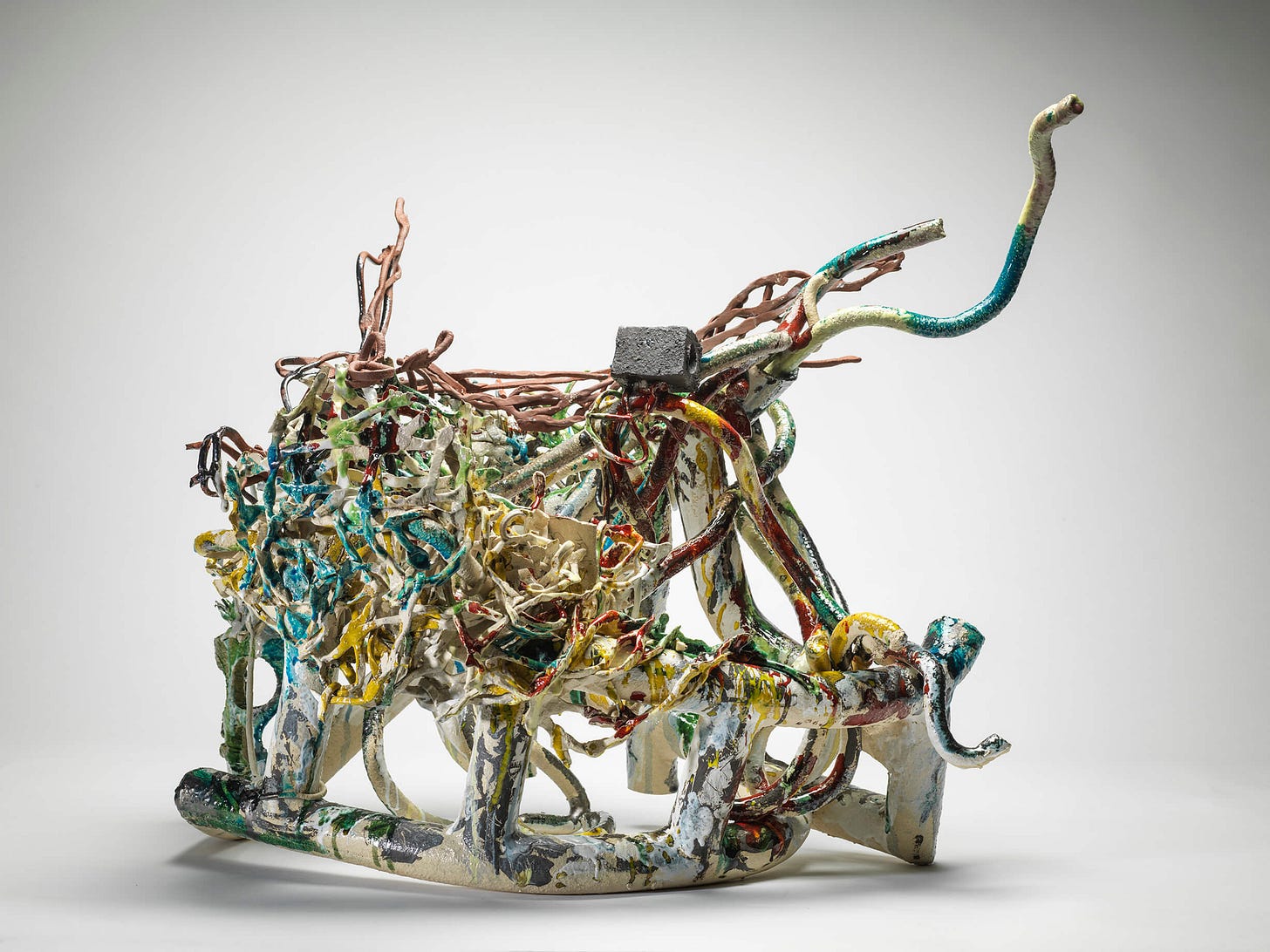American Education | essay by Leila C. Nadir
Madinah flexed her legs, pointing her toes higher, like a ballerina. A foot landed in my lap. “Feel them.”
Welcome to Khôra, a dynamic online arts space produced in collaboration with Lidia Yuknavitch’s Corporeal Writing. Visit our Archive to read previous issues. Scroll down if you would like your work to be considered for future issues.
American Education by Leila C. Nadir
Every Sunday afternoon after classes and prayers at the mosque, I helped my cousin Madinah with her school homework. We’d sit on her bed in her basement bedroom, textbooks, notebooks, papers spread around us, while our parents drank tea upstairs. Our heads bent over assignments, I’d try to keep focus and ignore the Bollywood superstars staring down at us from every wall. Posters of Bollywood guys in unbuttoned shirts with hairy glistening chests. Posters of Bollywood actors in tight pants with mussed-up black hair. I was about to say here that Madinah’s bedroom was a Bollywood shrine, but that wouldn’t be accurate. Every Sunday, I had to save Madinah’s teetering grades from within a Bollywood orgy.
I was an above-average student, not too hard-working but careful to never let my grades fall below Bs because of that do-or-die life-rule preached by every teacher, including my own teacher-mother: Good Grades will get you into a Good College, which leads to a Good Job which leads to a Good Salary while leads to that added perk of Good Health Insurance, and if you fall off this track, good luck to you, who knows what might happen.
I knew Madinah had missed some schooling while a refugee in Pakistan—for years I’d been helping her with homework even though she was two years ahead of me in school—I was mindful that my tutoring could be the difference that gave her a shot at Good Grades and a Good Future. So she wouldn’t fall into that frightful abyss no one could bear to imagine.
Pencil in my hand, I opened Madinah’s US History textbook. I was fourteen now, in ninth grade, on my high school’s college track; Madinah was sixteen, in eleventh grade, and she brushed her long black hair in the mirror, pretending she was about to listen. I saw a new poster on the wall, an actor I recognized from some Bollywood flicks—he was astride a horse, looking like he’d just galloped out of a sexual storm, hair wind-blown, shirt ripped open. Like the cover of a romance novel. How did Madinah get away with this? Her father was as strict as mine. Maybe stricter. He didn’t notice the eyes of Mr. Indian-Horsy-Hotness aimed straight at his daughter’s twin bed?
Madinah dropped the brush and flopped onto the bed, her long shirt a wave of bored fabric. I flipped a textbook page and I tapped a passage with the pencil. “The answers are buried in the sentences, Madinah, find the keywords, it’s easy.”
And it was easy. For me. I could scan a column of text in seconds. Meaningful words popped out at me. It was an unconscious feeling I’m aware of only now—how books were reliable, no back-and-forths, no erasures. Sure, meanings shifted, interpretations evolved, but the black etches of letters on white pages did not move. I stared into them the way I read my backyard’s bare angled branches against cloudy skies in winter—a support system with patterns I could hold onto. One time, I read a book on English grammar just for fun, cover to cover. Subjects, verbs, clauses, adjectival phrases—my hair tingled like spirits had entered the room—sentences broken apart and reassembled, meanings the same, but not totally, not really. Something amiss, nuances, subtleties of meaning, but always there were references, proof, structures to rely on, stability I didn’t have at home.
I pointed to a paragraph. “The answer’s here, see?”
Madinah sly-smiled and rolled her eyes, lying back on her bed, arms under her head, below horse-riding hottie’s sexy conquering glare. “You do the worksheet for me.”
“Madinah”—I was shocked—“I can’t do that. Homework is important!” Her Future!
She grabbed my ankle under my loose pirhan tumban pants. “How do you get your legs like that? Do I need a special razor?”
After two years of my tutoring, Madinah wasn’t interested in my academic lessons anymore. No more American History or American Politics or Algebra or Chemistry or other high-society topics. Which is a lofty way to say: Madinah wanted me to educate her about American romance and beauty customs. As the only Muslim girl at my high school, with a father who wouldn’t let me socialize with Americans, or do much of anything else after school hours, I wasn’t used to being treated like an authority on anything girl-related. But I was born in the US, and I had an American mother, so I jumped at this chance to share my anthropological observations with a girl in need of guidance. We could work on her grades later…
Read American Education on Khôra.
Leila C. Nadir is an Afghan-American writer and artist working on a memoir that examines the global geopolitics that invade our living rooms and the intimate violences that reverberate across the planet. She has received awards and fellowships from MacDowell, Hedgebrook, Bread Loaf, de Groot Foundation, Tin House, Aspen Summer Words, and Maine Arts Commission. Her writing has appeared (or will soon) in Michigan Quarterly Review, Black Warrior Review, Khôra, Shenandoah, North American Review, Asian American Literary Review, Aster(ix), and ASAP/J.
Cary Adams is an interspecies kin-maker, folk-punk musician, environmental artist, and creative-critical researcher investigating a modern memory disorder that he and his collaborator Leila Nadir call “industrial amnesia.” His work is in the collections of the Whitney Museum of American Art and the New Museum and has been supported by awards, fellowships, and residencies from the National Endowment for the Arts, New York Foundation for the Arts, New York State Council on the Arts, Franklin Furnace Fund, and the Maine Arts Commission.
Recent Posts
We and Crows | poem by Kate Finegan
angelito | flash fiction by aureleo sans

Swim around in Khôra.
Artists and Writers
We’re looking for our next team! To enter Khôra’s collaborative waters:
Writers, read about Khôra’s 500 Words here.
Artists, send your artwork to Khôra's Images here.
Many thanks to all of you who have sent us work. Your words/images will always remain active in KHÔRA’s ocean, and you won’t ever receive a notice of rejection from us. We know this process is not perfect; we wish to stay open to the possibility that at any point, your work will be a fit for a curated issue or team collaboration.
If you love what you’re seeing, please subscribe, share, tweet, retweet, and post, and KHÔRA will be back soon.
With galactic gratitude,
Leigh Hopkins
and the Corporeal/Khôra squad



